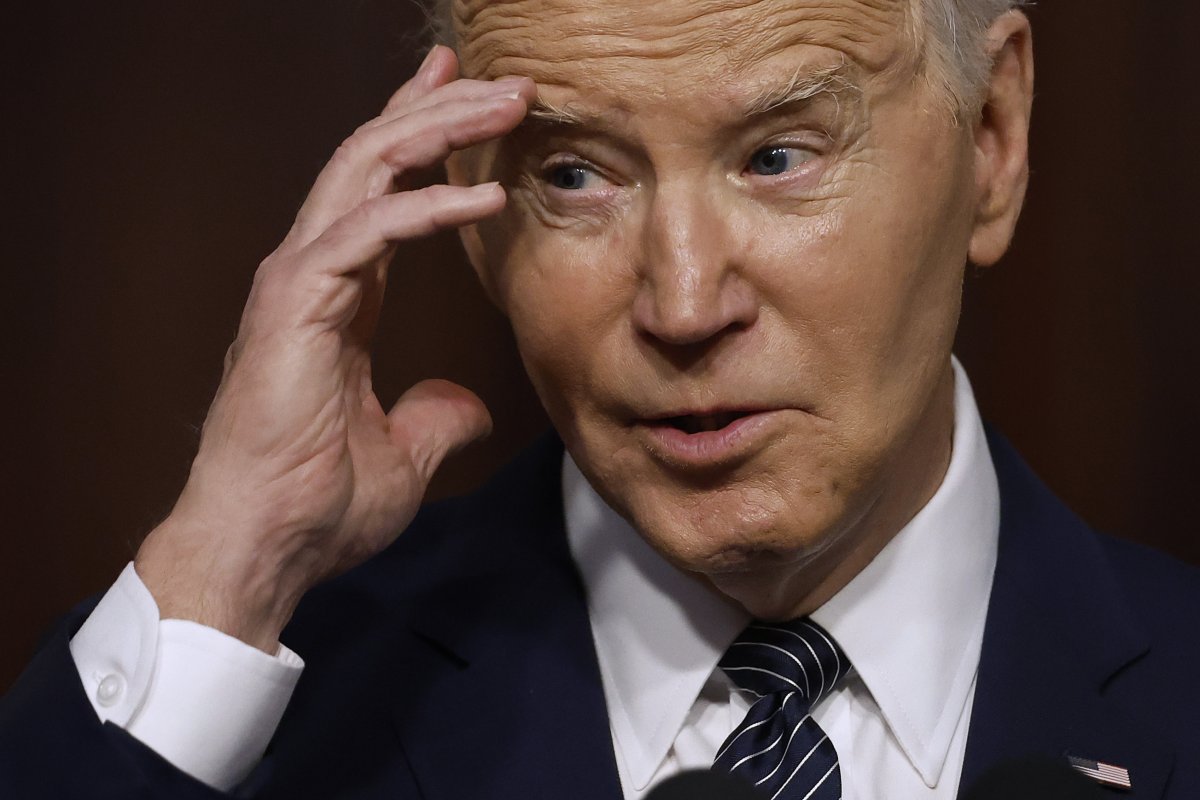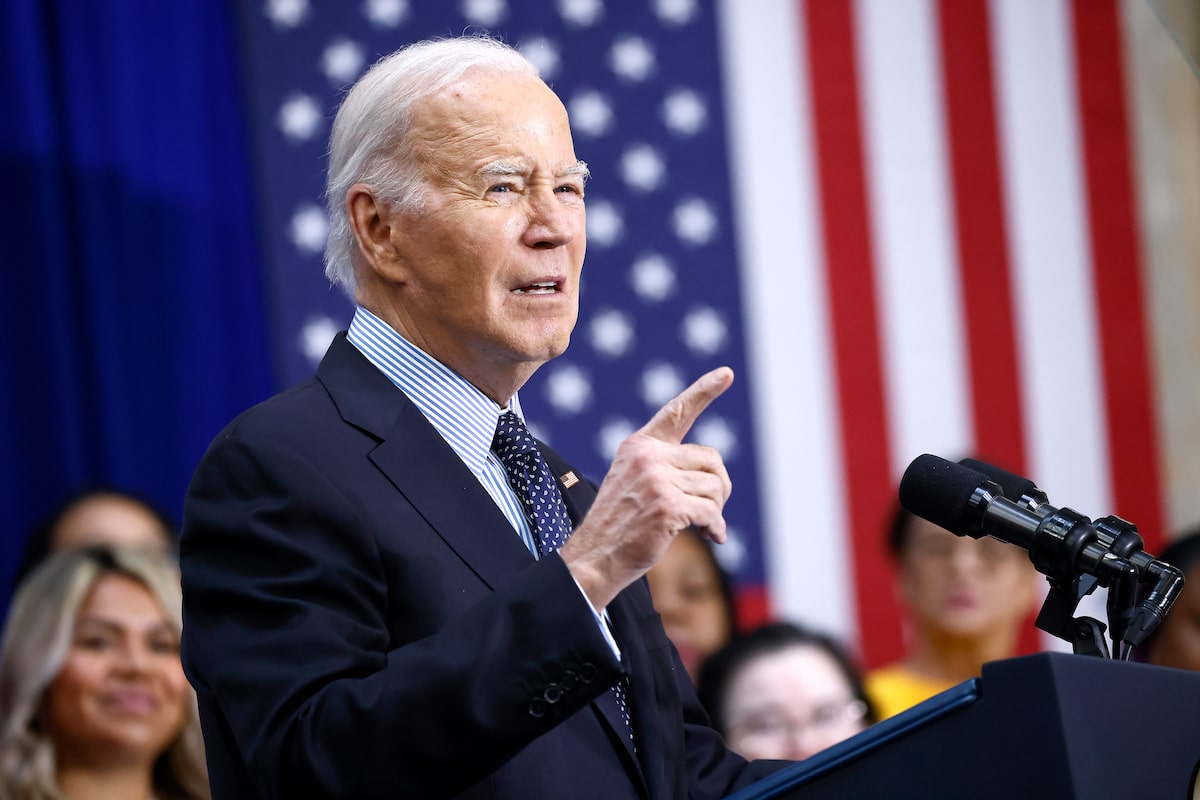Plenty of data suggests Trump is making surprising gains with young Americans. The debate, explained.

www.vox.com
Are young voters really embracing Donald Trump?
Plenty of data suggests Trump is making surprising gains with young Americans. The debate, explained.
By
Christian Paz@realcpaz Apr 10, 2024, 6:00am EDT
Share this story
A child waits in line at the Waco Regional Airport ahead of Donald Trump’s rally on the 30-year anniversary of the deadly standoff between Branch Davidians and federal law enforcement on March 25, 2023, in Waco, Texas. Brandon Bell/Getty Images
Christian Paz is a senior politics reporter at Vox, where he covers the Democratic Party. He joined Vox in 2022 after reporting on national and international politics for the Atlantic’s politics, global, and ideas teams, including the role of Latino voters in the 2020 election.
Are young voters abandoning
Joe Biden? And, if so, are they flocking to
Donald Trump?
Just about every national poll seems to show that Biden is underperforming with young people compared to his 2020 results as well as polls at the same point in the 2020 cycle. But the crosstab results of some of these surveys also suggest that Biden is not only losing ground; Trump is gaining support. That’s an especially surprising result for the famously progressive and Democratic-leaning youth vote. What gives?
The debate can be broken down roughly into two camps. There are those who believe Trump and Republicans are gaining with this group, telling you to trust the data. There are just too many polls and surveys, they say, reporting favorable conditions for Republicans and for Trump to not believe that young voters are swinging his way. Polling aggregates show Republicans making gains with younger voters, they point out.
The skeptical side is splintered. There are those who say the pro-Trump shift exists but is being overstated, noting polls specifically of younger voters still show a Biden edge — albeit a diminished one. There are others who question the validity of the polling, saying wild swings between surveys suggest there may be methodological problems. And others say third-party support shows Biden has room to win back voters in a way that Trump doesn’t.
The reality is still a warning sign for Biden and Democrats. Something is happening to their support from the youngest voters, and they’ll need to win back these folks or make up any deficit with support from other voters. Let’s dive in.
The case that there’s a real pro-Trump youth shift happening
Look at what the polling aggregates tell us. Instead of looking at any single poll, take their sum view, conveniently updated every month in
this cross-tabulation tracker from the former Democratic pollster Adam Carlson. Regardless of whether you look at the 18–34 or 18–29 subgroups that are often used in polling young voters, it’s clear that Biden is underperforming his 2020
numbers. In March 2024 polls alone, that shift from 2020 for those adults aged 18–29 was about 13 points toward Trump, even though Biden still holds an overall advantage of 11 points in the aggregate. Among adults aged 18–34, Trump holds a slight lead of about 1.5 percentage points. And this has generally been consistent when looking at the aggregate results of January and February 2024 polls as well.
Trump is also viewed more favorably among young voters. Another consistent picture has emerged over the last few years: Trump’s
favorability rating among the youngest cohort of voters has been steadily increasing. As of the end of 2023, that improvement has brought his standing with adults aged 18–34 back from a post-January 6 low point right to the same support he had on the eve of the
2020 election, according to Gallup polling. Other polls, like the
Economist/YouGov’s surveys, found that by February 2024, Trump’s favorability among those under the age of 30 had finally turned positive, improving about 30 points since February 2021.
Are there issues that are motivating this? Looking under the hood at what might be motivating a pro-Trump youth shift also reveals that Trump might be getting support from younger voters who trust him on specific issues. The
Harvard Youth Poll in December, for example, showed Trump had an edge over Biden on a range of key issues with younger voters. On the
economy, Trump had a 15-point lead; on
national security, he had a 9-point lead; on the
Gaza war, Trump led by 5 points; and on “strengthening the working class,” Trump had a 4-point advantage. Biden, meanwhile, had an edge on
climate change,
abortion, education, and “protecting democracy,” among a few other issues.
It might not be isolated to Trump. Republicans have also seen gains in voter registration numbers with younger voters, most recently in North Carolina, as well as in swing states like Nevada and Pennsylvania, per
tracking from the analyst Michael Pruser. In North Carolina, for example, younger voters are currently a larger share of all new registrants than at this point in the last two electoral cycles — but Democrats have lost a net 40,000 registrants in that time, while new young Republican registrants outnumbered new young Democratic registrants. So while both parties are gaining new voters, the Democratic advantage with this age cohort is narrowing quickly.
The case that Republican youth support is overhyped or nonexistent
Skepticism is healthy. Polls this far out, this side of the argument says, are unlikely to fully and accurately capture what is happening with demographic groups that are harder to reach and less engaged and aware of politics. This caveat applies both to polls taken before and during the primary — when plenty of voters aren’t even sure that the two choices they are being presented with will end up being the eventual nominees — and for polls of young voters specifically, who are notoriously uninformed about or disengaged with national electoral politics.
Trump’s support may be overstated; just look at third-party support and his favorability. Polls specifically of young voters, like the Harvard Youth Poll, continue to show a large Biden advantage with younger voters (it was 11 points in December). They show that among the youth most likely to vote, Biden has an even bigger advantage (24 points).
But they also show the threat of third-party candidates, which may be artificially dragging down Biden’s support. Adding those independent candidates, like Robert F. Kennedy Jr., brings down Biden’s support tremendously in both the Harvard poll and in the election tracking site Split Ticket’s recent poll of young voters. Biden has an edge with them over both Trump and RFK, and that lead grows when looking at those most likely to vote. But RFK is still pulling a “non-trivial” amount of support from young Democrats and independents, groups that went for Biden in 2020, in both the Harvard Youth Poll and the Split Ticket poll.
Complicating the picture for Republicans and Trump is the problem of favorability. Yes, Trump has recovered from his low point in 2021, but he consistently hits a roof of support in Split Ticket’s polling. Though both Biden and Trump are viewed unfavorably (65 percent for Biden, 70 percent for Trump), those who hold a “strongly unfavorable” view of Trump drastically outnumber the same category for Biden: 61 percent of young voters view Trump very negatively compared to just 44 percent who feel like that about Biden. “If young voters are defecting from Joe Biden, they’re not doing so out of any affinity for Donald Trump,” write the Split Ticket authors. So instead of a Trump youth rise, we’re seeing a collapse of youth support for Biden.
We’re forgetting who we’re talking about. Younger voters
tend to be more progressive and align with Democratic positions on a range of social and economic issues; they’ve voted for Democrats by overwhelming numbers; and they’re continuing to support Democratic positions in a variety of elections during midterms, off-year races, and special elections. Younger voters are especially likely to register or identify with neither political party, opting to be independents or unaffiliated voters when they register to vote, helping to explain why in some states, like North Carolina, Nevada, and Colorado (per Pruser’s analysis), unaffiliated registrants are outpacing Democratic and Republican registrants. With this context, it does seem hard to believe that we’re heading toward a generational realignment.
Is it just too early?
The answers here aren’t easy, most notably because polling seems to be extra noisy and sending conflicting messages. Even this month, the results of two high-quality national polls, one from Quinnipiac University and another released by
Fox News, showed conflicting realities. In Quinnipiac’s survey, the results for young adults aged 18–34 gave Biden a 20-point advantage over Trump. Meanwhile, Fox’s survey showed that adults aged 18–29 backed Trump with an 18-point margin. This 38-point gap seems illogical, even if there are some discrepancies with the cohorts used in the surveys.
And that leads us to a methodological question hanging over all of this. The way
pollsters conduct their
operations, as we have
detailed before, has been evolving to address difficulty with telephone polling and non-response bias (when the results of a poll are affected by the unwillingness or absence of a specific kind of voter). In 2016 and 2020, for example, this non-response bias affected how pollsters were able to measure Trump’s support and therefore underestimated it. 2024 could very well be the reverse, but it’s much too early right now. The answers will reveal themselves after Election Day. One thing, though, feels certain: If the polls are right, Democrats have a problem with young voters. They have time to fix that, but they have a major problem if they can’t.















 www.vox.com
www.vox.com
/cdn.vox-cdn.com/uploads/chorus_image/image/73268538/1476391166.0.jpg)


